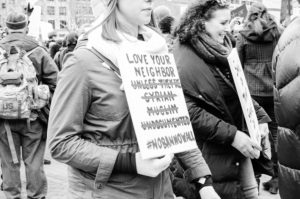You, Not You: Policy Incoherence and the Travel Ban
Like a belated New Year’s present to his steadfast base, on January 31, 2020, President Trump added six countries—Eritrea, Kyrgyzstan, Sudan, Myanmar, Tanzania, and Nigeria, which is Africa’s most populous country and largest economy—to his administration’s long-contested travel ban list. The move enraged many and has been widely criticized by Democrats as clearly discriminatory against people from predominantly Black and Muslim countries.
The Washington Post reported that officials at the Department of Homeland Security and the Department of State cited “national security concerns” as justification for the expansion.
But to many the expanded ban, which took effect on February 22, came as no surprise since the president made his intentions of overhauling the existing immigration system clear at his very first State of the Union address in January of 2017, where he introduced a four-pronged immigration reform plan. The proposal, Trump said at the time, would offer a path to citizenship for the 1.8 million undocumented immigrants brought to the US by their parents at a young age, secure the US-Mexico border, end the visa lottery system and move toward a “merit-based” immigration system, and “protect the nuclear family by ending chain migration.” Going further, he shared his vision for the plan by declaring, “It is time to begin moving towards a merit-based immigration system—one that admits people who are skilled, who want to work, who will contribute to our society, and who will love and respect our country.”
In an ideal world, this plan and its communicated vision would merit the sort of robust consideration plans of such scale do, except doing so would require a complete dissociation from the reality of the past couple of years where Trump, uninterruptedly, campaigned on the backs of Mexican immigrants to victory. At campaign rallies where he got listening ears, he demonized Mexican immigrants as “rapists” (among many other despicable tropes) and, most recently, referred to African immigrants’ places or origin as “shithole countries.”
However, reflecting on the most recent additions to the travel ban, ostensibly added for national security reasons, it’s clear Trump’s list just doesn’t add up.
For one, the Cato Institute’s Alex Nowrasteh found that not a single person born in Nigeria, Tanzania, Eritrea, or Myanmar has been responsible for a single terrorist attack on American soil between 1975 and 2016. (And there have been none since.)
Furthermore, a Pew Research Center report found that roughly six-in-ten (59 percent) of Nigerian immigrants in the US had a bachelor’s degree or more—a percentage roughly twice that of Americans born in the US, which sits at 33 percent, and also more than the share for immigrants from South Korea (56 percent), China (51 percent), UK (50 percent), and Germany (38 percent).
And according to a tabulation of data from the US Census Bureau by the Migration Policy Institute, 54 percent of Nigerian immigrants in the US are working in highly skilled jobs in management, business, science, and the arts compared to 39 percent of US natives. Another US Census Bureau survey indicates that Nigerian-Americans have a median income well above the average American, and a new report by the New American Economy Research Fund shows that in 2018 alone, Nigerian immigrants in the US earned more than $14 billion and paid more than $4 billion in taxes, proving that Nigerian immigrants are not only highly skilled, but they also contribute to American society and check every item on Trump’s “merit-based” immigration checklist. Only problem: they are Nigerians!
But what happens at a time like this, when truth and facts are like water and take the shape of whatever object or objective Trump dumps them into? What happens when a president sacrifices policy coherence for a base that lives in fear of a nonwhite majority or thinks immigration is a zero-sum game? When highly skilled, well-educated, English-speaking immigrants who can assimilate easily and give back to the country show up, and he says, no, not you? What happens next?

